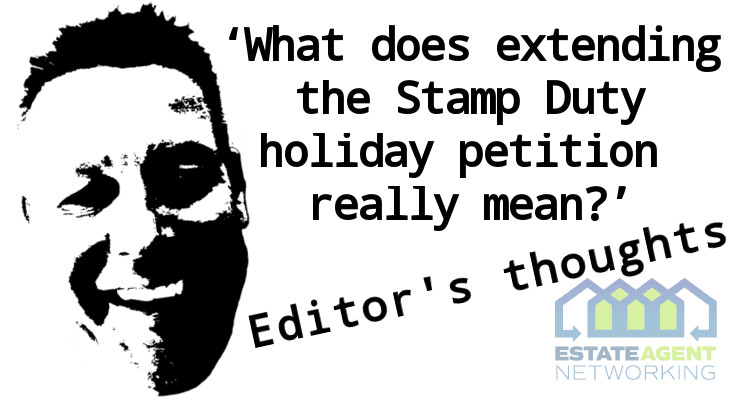What does extending the Stamp Duty holiday petition really mean?
At 15-minutes past Eleven, PM on Sunday night there were 109,599 signatures to the petition that wanted to extend the stamp duty holiday, 9,586 more than was required to trigger a debate in parliament. According to the government website there will now be 48 hours before a date is given for when the debate will be heard.
What perhaps is more important is the wording of the petition that everyone signed. The petition had a very specific thrust, and I quote, it wanted a debate to,
‘Extend the Stamp Duty Holiday for an additional 6 months after 31st March 2021
Extending the Stamp Duty Holiday for an additional 6 months will assist many buyers who are looking to move to a property that they will not be able to afford otherwise. This will help to stabilise the housing market
I am looking to move into a new build which is currently due to complete at the start of March 2021. If this build is delayed past 31st March 2021 then i will not be able to afford the stamp duty so will not be able to afford the house.
109,599 signatures
Parliament will consider this for a debate Parliament considers all petitions that get more than 100,000 signatures for a debate Waiting for 2 days for a debate date.’
WHAT CONCLUSIONS ARE APPARENT?
1 If the matter is debated and the extension is allowed on the terms of the petition then the stamp duty holiday will end on the last day of September 2021.
2 There is a budget early March, so would the Chancellor want to make a decision at that point? Giving him time to judge all factors, Lockdown 3.0, the state of the economy, the ability for people to safely move in March, and of course the 250,000 plus SSTC sales in the log jam at present.
3 Could the SDLT holiday be extended by three-months? Or could there be no extension?
4 There are other factors to consider; if you look at the petition and look at where the signatories live, it becomes a very London, and counties bordering London centric topic.
5 In Wales, Scotland and 90% of Ireland, taking each of those and breaking them down by constituencies, only one to 71 people in each, voted for the petition. Whereas in the London and circling constituencies typically 350 to 500 constituents signed the signature.
6 The supporters of the petition are mostly living in the areas of highest property value, obviously there are exceptions, but that is the general picture. So is SDLT in reality a wealth tax? Not a universal tax, and if so, should it be revised?
7 A lot of Conservative politicians are in the SDLT high-rate hot spots, so will that trickle into the governments thinking.
8 Nothing is straightforward, but by Wednesday we should have a debate date, so stage one of the process, but my guess is the devil will be in the detail.









